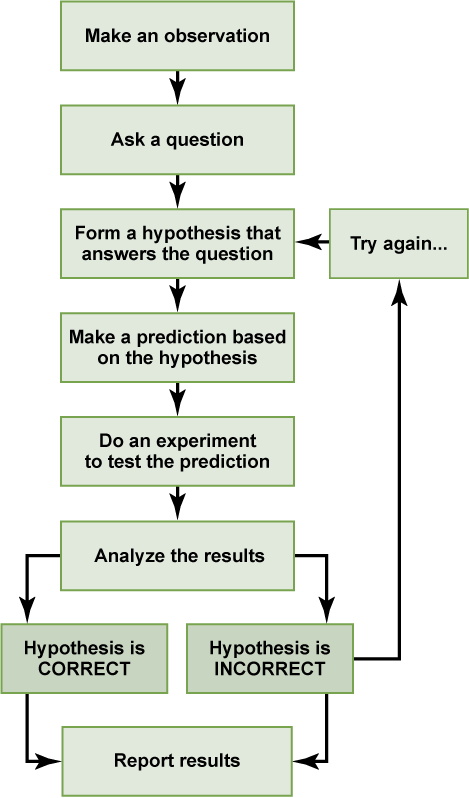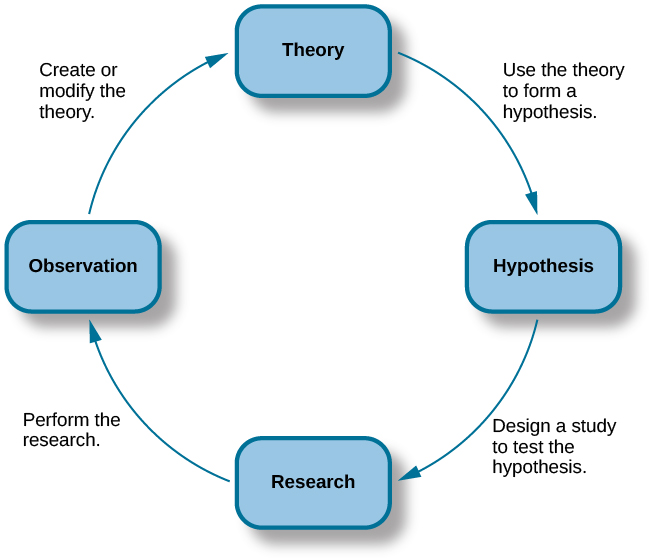Learning Objectives
- Explain how scientific research and the scientific method are used to address questions about behavior
The goal of all scientists is to better understand the world around them. Psychologists focus their attention on understanding behavior, as well as the cognitive (mental) and physiological (body) processes that underlie behavior. In contrast to other methods that people use to understand the behavior of others, such as intuition and personal experience, the hallmark of scientific research is that there is evidence to support a claim. Scientific knowledge is empirical: It is grounded in objective, tangible evidence that can be observed time and time again, regardless of who is observing.
While behavior is observable, the mind is not. If someone is crying, we can see the behavior. However, the reason for the behavior is more difficult to determine. Is the person crying due to being sad, in pain, or happy? Or are they suffering from depression? Sometimes we can learn the reason for someone’s behavior by simply asking a question like, “Why are you crying?” However, there are situations in which an individual is either uncomfortable or unwilling to answer the question honestly, or is incapable of answering. For example, a depression rating scale may be used to assign a score to a person’s behavior where that score can determine whether that person should be evaluated more thoroughly for a depressive disorder. In some circumstances, the psychologist may have to be creative in finding ways to better understand behavior. This module explores how scientific knowledge is generated, and how important that knowledge is in forming decisions in our personal lives and in the public domain.
Try It
Process of Scientific Research

Figure 2. The scientific method is a process for gathering data and processing information. It provides well-defined steps to standardize how scientific knowledge is gathered through a logical, rational, problem-solving method.
Scientific knowledge is advanced through a process known as the scientific method. Basically, ideas (in the form of theories and hypotheses) are tested against the real world (in the form of empirical observations), and those empirical observations lead to more ideas that are tested against the real world, and so on.
The basic steps in the scientific method are outlined below:
- Observe a natural phenomenon and define a question about it.
- Make a hypothesis, or potential solution to the question.
- Test the hypothesis.
- If the hypothesis is true, find more evidence or find counter-evidence.
- If the hypothesis is false, create a new hypothesis or try again.
- Draw conclusions and repeat—the scientific method is never-ending and no result is ever considered perfect.
In order to ask an important question that may improve our understanding of the world, a researcher must first observe natural phenomena. By making observations, a researcher can define a useful question. After finding a question to answer, the researcher can then make a prediction (a hypothesis) about what they think the answer will be. The hypothesis is usually a statement about the relationship between two or more variables. After making a hypothesis, the researcher will then design an experiment to test their hypothesis and evaluate the data gathered. This data will either support or refute the hypothesis. Based on the conclusions drawn from the data, the researcher will then find more evidence to support the hypothesis, look for counter-evidence to further strengthen the hypothesis, revise the hypothesis and create a new experiment, or continue to incorporate the information gathered to answer the research question.
Basic Principles of the Scientific Method
Two key concepts in the scientific approach are theory and hypothesis. A theory is a well-developed set of ideas that proposes an explanation for observed phenomena that can be used to make predictions about future observations. A hypothesis is a testable prediction that is arrived at logically from a theory. It is often worded as an if-then statement (e.g., if I study all night, then I will get a passing grade on the test). The hypothesis is extremely important because it bridges the gap between the realm of ideas and the real world. As specific hypotheses are tested, theories are modified and refined to reflect and incorporate the result of these tests.
Try It

Figure 3. The scientific method of research includes proposing hypotheses, conducting research, and creating or modifying theories based on results.
Other key components in following the scientific method include verifiability, predictability, falsifiability, and fairness. Verifiability means that an experiment must be replicable by another researcher. To achieve verifiability, researchers must make sure to document their methods and clearly explain how their experiment is structured and why it produces certain results.
Predictability in a scientific theory implies that the theory should enable us to make predictions about future events. The precision of these predictions is a measure of the strength of the theory.
Falsifiability refers to whether a hypothesis can be disproved. For a hypothesis to be falsifiable, it must be logically possible to make an observation or do a physical experiment that would show that there is no support for the hypothesis. Even when a hypothesis cannot be shown to be false, that does not necessarily mean it is not valid. Future testing may disprove the hypothesis. This does not mean that a hypothesis has to be shown to be false, just that it can be tested.
To determine whether a hypothesis is supported or not supported, psychological researchers must conduct hypothesis testing using statistics. Hypothesis testing is a type of statistics that determines the probability of a hypothesis being true or false. If hypothesis testing reveals that results were statistically significant, this means that there was support for the hypothesis and that the researchers can be reasonably confident that their result was not due to random chance. If the results are not statistically significant, this means that the researchers’ hypothesis was not supported.
Fairness implies that all data must be considered when evaluating a hypothesis. A researcher cannot pick and choose what data to keep and what to discard or focus specifically on data that support or do not support a particular hypothesis. All data must be accounted for, even if they invalidate the hypothesis.
Try It
Link to Learning
Want to participate in a study? Visit this Psychological Research on the Net website and click on a link that sounds interesting to you in order to participate in online research.
Why the Scientific Method Is Important for Psychology
The use of the scientific method is one of the main features that separates modern psychology from earlier philosophical inquiries about the mind. Compared to chemistry, physics, and other natural sciences, psychology has long been considered one of the social sciences because of the subjective nature of the things it seeks to study. Behavioral and social science research helps predict, prevent, and manage mental illness—in individuals and in whole populations. This research also helps people change their behaviors, understand, and adhere to treatments. Psychologists and other scientists use the scientific method to advance the description, explanation, prediction, and control of abnormal behavior.
Many of the constructs that psychologists are interested in—such as depression and anxiety—are subjective and cannot be directly measured. Major mental disorders like depression and anxiety affect about one in four American adults in a given year. Research into the causes and effective treatments are essential. In the course of treating a patient, a psychologist will take records of problems, insights, and techniques that were important in the patient’s treatment, and they often rely on behavioral observations and self-reported data, which are considered by some to be illegitimate or lacking in methodological rigor. Applying the scientific method to psychology therefore helps to standardize the approach to investigating complex human behaviors, thus allowing psychologists to create evidence-based strategies that solve problems and improve lives.
The scientific method allows psychological data to be to collected and used to interpret in order to better understand and solve some of society’s most challenging problems. Research data can be replicated and confirmed in many instances, under different circumstances, and by a variety of researchers. Through replication of experiments, new generations of psychologists can reduce errors and broaden the applicability of theories. It also allows theories to be tested and validated instead of simply being conjectures that could never be verified or falsified. Following the scientific method allows psychologists to gain a stronger understanding of how the human mind works.
Glossary
empirical: grounded in objective, tangible evidence that can be observed time and time again, regardless of who is observing
fairness: implies that all data must be considered when evaluating a hypothesis
falsifiable: able to be disproven by experimental results
hypothesis: (plural: hypotheses) tentative and testable statement about the relationship between two or more variables
predictability: implies that a theory should enable us to make predictions about future events
theory: well-developed set of ideas that proposes an explanation for observed phenomena
verifiability: an experiment must be replicable by another researcher
Candela Citations
- Modification and adaptation. Provided by: Lumen Learning. License: CC BY-SA: Attribution-ShareAlike
- Why is Research Important?. Authored by: OpenStax College. Located at: http://cnx.org/contents/Sr8Ev5Og@5.48:Hp5zMFYB@9/Why-Is-Research-Important. License: CC BY: Attribution. License Terms: Download for free at http://cnx.org/contents/4abf04bf-93a0-45c3-9cbc-2cefd46e68cc@5.48
- Psychology and the Scientific Method: From Theory to Conclusion, content on the scientific method principles. Provided by: Boundless. Located at: https://www.boundless.com/psychology/textbooks/boundless-psychology-textbook/researching-psychology-2/the-scientific-method-26/psychology-and-the-scientific-method-from-theory-to-conclusion-123-12658/images/the-scientific-method/. License: CC BY-SA: Attribution-ShareAlike
